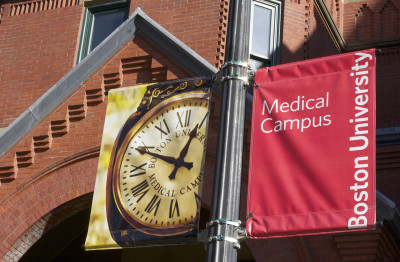 The Boston University School of Medicine and BU School of Public Health launched the Center for Implementation and Improvement Sciences Friday, according to a BUSM release. Administered under the BUSM’s Department of Medicine, the new center will provide research facilities for clinicians, administrators and health services researchers to focus on healthcare delivery for underserved populations, the release stated.
The Boston University School of Medicine and BU School of Public Health launched the Center for Implementation and Improvement Sciences Friday, according to a BUSM release. Administered under the BUSM’s Department of Medicine, the new center will provide research facilities for clinicians, administrators and health services researchers to focus on healthcare delivery for underserved populations, the release stated.
CIIS co-director Allan Walkey said the key to a successful healthcare center is not solely system improvement, but also the ability to rigorously and scientifically document the outcome. Walkey, a professor of medicine at BUSM, said he will work to improve the scientific element in the center.
“A lot of men and women put a lot of effort and work trying to improve care, but it’s just unclear after they do that whether there is something changed as a result of that,” Walkey said. “So really the point is to try to better learn from those attempts, to structure them in such a way that we can see if these attempts resulted in intended ways.”
Mari-Lynn Drainoni, fellow co-director of CIIS and a professor of health law, policy and management in SPH, said she plans to lead the implementation science component of the center.
“I’m excited about bringing more of an implementation science focus to the campus, especially this that is more safety-net focused,” Drainoni said in the release.
Combining implementation and improvement sciences together, Chairman of the Department of Medicine David Coleman said, CIIS is dedicated to improving hospital care through scientific methodology.
“Quality improvement sciences is how we improve the process of care in hospitals to achieve better outcome, and implementation sciences studies change, change management and the determinants of successful changes and sustainable change,” Coleman said. “The idea is to design projects that would ultimately and effectively implement change in healthcare systems with a safety net that protects vulnerable patient populations.”
CIIS will also provide effective methodical assistance to evaluate and monitor successful attempts to improve healthcare quality, Coleman said. He and his team have been planning the establishment of the center for more than a year, he said.
“We met with people in the two fields. We realized there are some wonderful people in the implementation sciences and wonderful people in improvement sciences,” Coleman said. “We thought if we put the center together, we might accelerate that marriage of these two fields.”
Coleman said the center aims to increase communication between implementation and improvement sciences and educate faculty and students on the two disciplines.
“We want to train medical students, doctors, nurses, social workers, healthcare administrators, public health students, so we have a pretty big agenda ultimately.” Coleman said. “The first year will be a lot of education, [creating] interest groups in seminar series and some pilot programs that combine the two field.”
Several students who study on BU’s Medical Campus said they are greatly interested in the new center, saying it will bring new air to the medical work field.
Shawn Zajicek, a second-year graduate student in the Sargent College of Health and Rehabilitation Sciences and SPH, said the center allows researchers and faculty members to push for scientific improvement.
“One issue is that clinicians learned something so long ago, and wouldn’t change or accept new ideas that have been found through science,” Zajicek said. “The new center can help doctors to stay updated to the new methodology.”
Kerrin Gallagher, a senior in Sargent, said the center might be a barrier for practicality due to a larger theoretical and conceptual presence.
“Sometimes [a new method] sounds good on paper, but sometimes it’s really hard to get the evidence-based kind of thing into actual practice and get patients behind it,” Gallagher said. “But [the center] seems like a really cool concept.”


















































































































